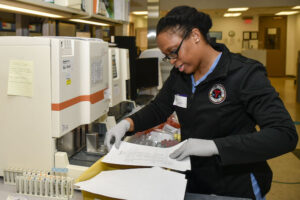
Story by Douglas Stutz
Naval Hospital Bremerton/Navy Medicine Readiness and Training Command Bremerton
For Ensign April M. White, becoming a Navy Medical Service Corps officer began during her initial duty station as a hospital corpsman.
The Fredericksburg, Virginia native transitioned into the laboratory community after being stationed at Lakehurst, New Jersey in 2008. She is currently Naval Hospital Bremerton’s laboratory manager and division officer.
“I’ve been working in Navy Medicine for 18 years,” said White, a Courtland High School 2005 alum and University of Incarnate Word 2021 graduate.
Helping manage the workload of NHB’s Laboratory statistically helps explain the importance of her position. The total volume just the main hospital lab handled last year alone for hematology, urinalysis, coagulation, blood bank, point of care testing, microbiology and cytology/histology testing totaled approximately 435,750.
Much of what the lab does is completely out of sight of the direct patient care provided. Yet that direct patient care could not be delivered without the lab’s support, which White ensures happens in a timely manner. It can be a challenge at times.
“The most challenging aspect of my position is managing the dynamic and often unpredictable nature of our operational requirements,” explained White. “Balancing multiple priorities while ensuring the highest standards of care can be demanding. But it also drives continuous improvement and adaptability of my laboratory team.”
White attests that there is fulfillment in her role and that of her lab team in performing the needed scientific testing and reporting the results to primary care managers as part of delivering timely care to patients.
“The most gratifying aspect of my position is witnessing our efforts’ positive impact on service members’ health and well-being. Knowing that our work directly contributes to the mission readiness and overall quality of life for those we serve is incredibly rewarding,” stated White.
White is one of approximately 25 MSC officers assigned to NMRTC Bremerton, providing expertise in 31 specialties which comprise three basic branches – Health Care Administration, Clinical Care and Health Care Science – to handle myriad responsibilities throughout the many Navy Medicine hospitals and clinics across the seven seas.
Health Care Administration consists of education and training management, financial management, fleet marine force, general health care administration, health care facilities planning, information management, manpower systems analysis, medical logistics management, operations research, patient administration, and plans, operations and medical intelligence.
Clinical Care specialties include audiology, clinical psychology, dietetics/food management, occupational therapy, optometry, pharmacy, physical therapy, physician assistant, podiatry, and social work.
The Health Care Science field encompasses aerospace experimental psychology, aerospace physiology, biochemistry, entomology, environmental health, industrial hygiene, medical technology, microbiology, physiology, radiation health, and research psychology.
The Medical Service Corps is long known as Navy Medicine’s most diverse corps because of the dependable commitment by officers like White.
“My work contributes to the diversity of the Medical Service Corps by fostering an inclusive environment and leveraging our team’s unique skills and perspectives. Collaborating with professionals from various backgrounds enhances our problem-solving capabilities and delivers comprehensive healthcare solutions,” stated White, adding that being part of the MSC legacy which began August 4, 1947, has given her a meaningful sense of accomplishment.
“Being part of the 77-year legacy of the Medical Service Corps is an honor. It means upholding a tradition of excellence, innovation, and dedication to service. I am proud to contribute to a legacy that has continuously evolved to meet the needs of the Navy and its personnel. I am committed to carrying that legacy forward,” exclaimed White.